Historically, there are many values that Japanese people held dear to them, when life was still simple. The sentiment of ‘mottainai’ (what a waste) which I have mentioned before, exists because people used to treasure what they have. And in seeing what they treasure disappear, they say ‘mottainai’. While this isn’t a value for environmental protection per se, I believe it is at the heart of protecting the environment – treasuring our resources and feeling a sense of love for the environment around us, be it what we eat and where we thrive. In the farms we visited thus far, this sentiment was strong: we made sure that leftovers were kept for the next meal, and nothing edible was wasted during meal preparation. In the countryside, all the neighbours know each other, and they gift each other the food they make, and sometimes even come together to cook with the ingredients they each bring.
However, the farmers shared that this is changing, because the younger generations are unable to understand where the value comes from. Because of how available all our resources seem to us in the cities (convenience stores, supermarkets), we often forget how difficult it is and how much work goes behind the scenes to procure all these resources, and there is no need to think ‘mottainai’. Even though I previously thought that everyone finishes all their food when they eat at restaurants due to the presence of this value in Japanese culture, we found out that it isn’t true. While there are people who do ensure that they finish all their food for this reason, there is also an increasing number of people who don’t hold this value anymore.
We arrived in Tokyo with the perception that we wouldn’t be able to find these deep rooted, beautiful values, but rather be surrounded by modern, consumerist cultures. While that was true to some extent, there are people who care. I felt so alienated by the coldness of Tokyo after two whole weeks of being in the the warm countryside where strangers greet each other (I even smiled and greeted a stranger on the streets of Tokyo on reflex, and surprised both the other party and myself). But after visiting some farmers markets and organic stores, we realise that while small, there are people who care and still hold these deep values. It’s so important for these people to be here as they are the catalysts of change in these large and scary cities – I met farmers of vegetable and free range egg farms, distributors of organic food and companies supporting socio-environmental causes, such as a fairtrade company bringing in organic bananas to Japan (and with minimal packaging)! What warmed me the most wasn’t their amazing initiatives, but how they were so willing to share their knowledge, happiness, love and hard work. Even though I took their precious time away from work (I even talked to some of them for almost 10min!), most of them gifted me with something as thanks – although I should really be the one thanking them. I was gifted an egg from a free range egg farm, and a banana from the fairtrade company, which touched me so so much.
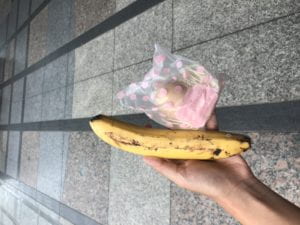 The banana and egg I received as gifts :’)
The banana and egg I received as gifts :’)
I was also thinking about how modern Japanese culture has come to be and why Japan seems to use excessive packaging and cosmetically filter their food more than other countries do, and I realise that much of it is rooted in their culture of hospitality. It seems to have manifested itself in the consumerist market as all the issues we are identifying now – cosmetic filtering, excessive packaging, all serve as a way to show respect and hospitality even in the modern times. At department stores for instance, Japanese shops will always give generous servings of samples (exposing Coco’s guilty pleasure) as a show of hospitality to the customers. Knowing that these issues are rooted in such values confuses me, but I think it teaches me that understanding cultures goes beyond the surface, and requires deep understanding of why certain things are done. It’s easy for us to get mad at all the packaging we see, but if we understand the scenario charitably, we can actually learn a lot from it, and slowly unpack what we have to do to resolve the issue.
While it may appear that values such as mottainai have disappeared along with the times, I believe they’re still somewhere in people’s hearts and that these values can be ignited once more, especially with the hard work of all these people. A farmer shared with me that his regulars and the people he gets to know at events start to get aware of the issue and ask for ugly fruits and vegetables, so he brings them along to farmers markets. Although he doesn’t display them, he knows his regulars and informed customers will ask for them. While this isn’t at the level of community building yet, this connection and heart behind reducing waste is so touching to hear.
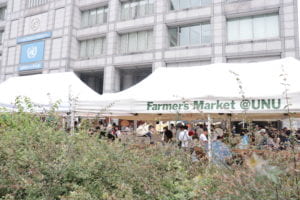 Farmer’s Market at the United Nations University (every Saturday!)
Farmer’s Market at the United Nations University (every Saturday!)
 The farmer whom brings ugly food to his stall at the UNU Farmer’s Market
The farmer whom brings ugly food to his stall at the UNU Farmer’s Market
Being at such events (at really popular locations) also tells us that the movement is gaining traction, and organic food is becoming more and more mainstream in Tokyo. While it is currently still presented as a luxury and at slightly exorbitant prices, they are slowly becoming more available to the wider public.
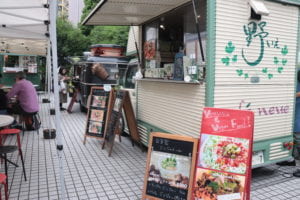 Surprisingly affordable vegan food at UNU Farmer’s Market!
Surprisingly affordable vegan food at UNU Farmer’s Market!
With the climate crisis approaching, increasing poverty and world hunger, and so many other problems that humans have created, I think there is some hope – that lies with passionate hearts, and connecting them to create powerful communities.
In this cold city, I found so much passion that really warms my heart.
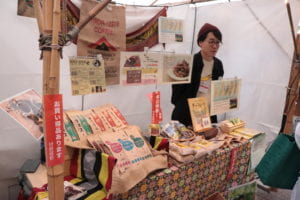 The kind employee sharing about ethical bananas – at an organic mini farmer’s market right outside Takashimaya Shinjuku!
The kind employee sharing about ethical bananas – at an organic mini farmer’s market right outside Takashimaya Shinjuku!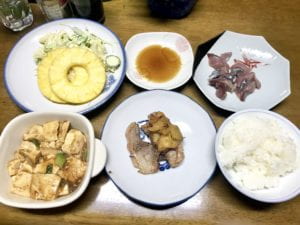 My usual dinner at Noto – with イノシシ (wild boar) and saba sashimi
My usual dinner at Noto – with イノシシ (wild boar) and saba sashimi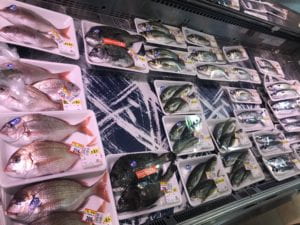 Fish at the local supermarket
Fish at the local supermarket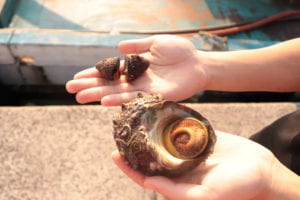 The sazae we caught!
The sazae we caught!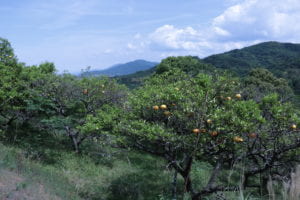 One of Coco’s beautiful pictures of the mikan trees!
One of Coco’s beautiful pictures of the mikan trees!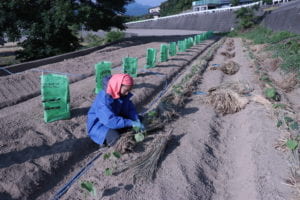 (Protecting the crops with hay – eliminates plastic use!)
(Protecting the crops with hay – eliminates plastic use!)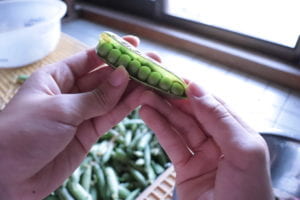 (Beautiful organic peas!)
(Beautiful organic peas!)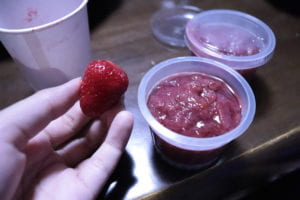 (These organic strawberries… were so good…)
(These organic strawberries… were so good…)